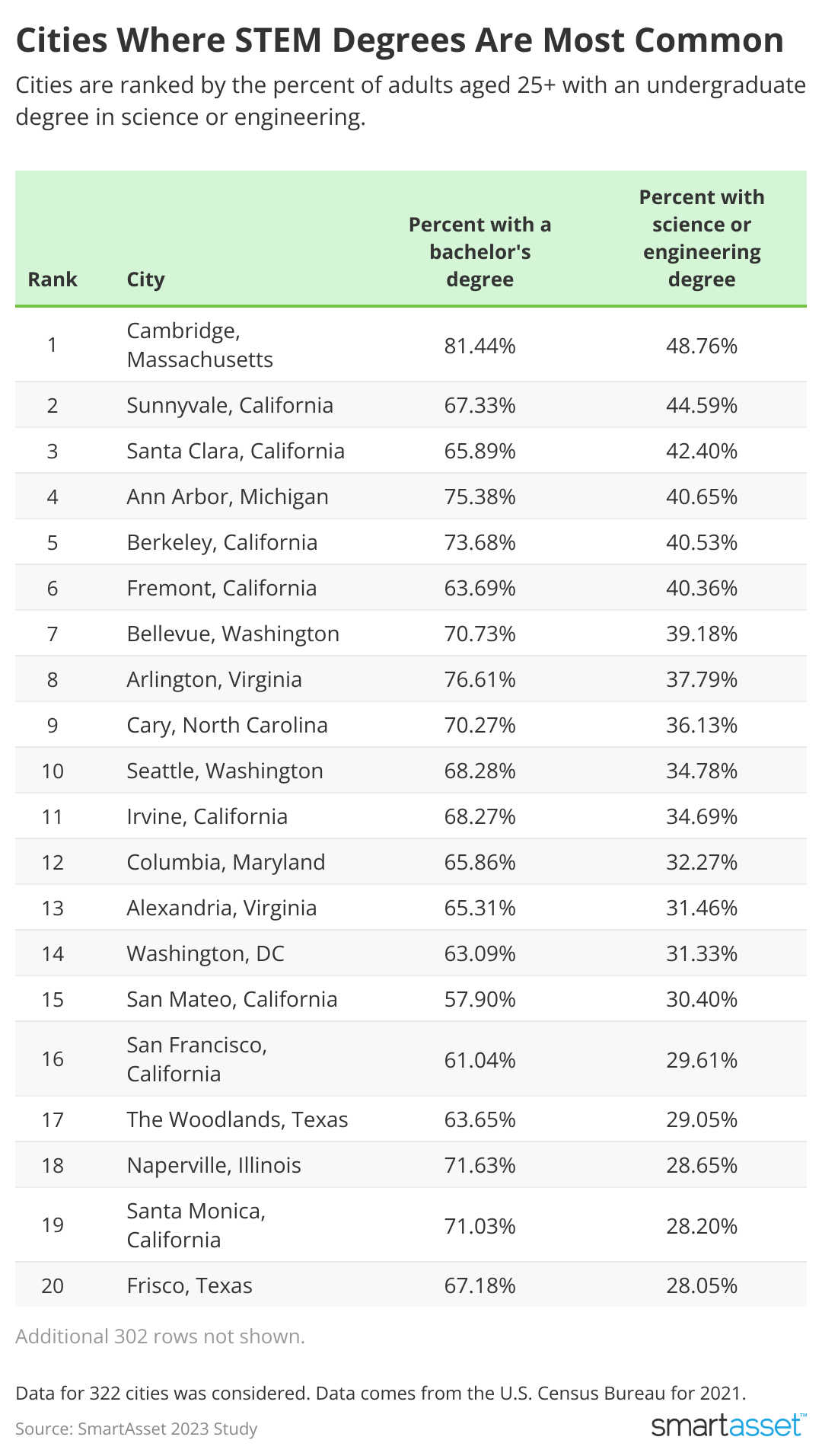10 cities that attract the most science and engineering college grads

Canva
10 cities that attract the most science and engineering college grads
Two women scientists discuss their findings in a laboratory environment
As the fields of science, technology, engineering, and mathematics (STEM) continue to grow, more and more undergraduate college students are focusing on these areas of study. According to data from the National Center for Education Statistics, 42% more STEM degrees were conferred in 2020-21 than 10 years earlier.
With this in mind, SmartAsset examined Census Bureau data to determine which cities have the highest percentage of people 25 and older with bachelor’s degrees in STEM. We considered 322 places with the largest 25-and-over populations.
Key findings
Cambridge, MA, is No. 1. No city has a higher percentage of adults with STEM degrees than Cambridge. Home to Harvard University and MIT, nearly half (48.76%) of all Cambridge residents 25 and older have a bachelor’s degree in science and engineering.
Over 75% of adults in these cities have bachelor’s degrees. More than three-quarters of people 25 and older in Cambridge, Arlington, VA, and Ann Arbor, MI, have bachelor’s degrees. That’s more than double the average (37.4%).
NYC has the largest STEM base. New York City has 2.5 times as many people with STEM degrees (900,902) than Los Angeles, which has the second-most STEM-educated adults (349,493). Despite that, The Big Apple ranked 112th due to its large population.
Seattle, San Francisco, and Austin rank 10th, 16th, and 28th. However, several cities in the San Francisco Bay Area and greater Seattle area rank in the top 10. Roughly one third (34.7%) of Seattle adults have a STEM degree, compared to 29.6% in San Francisco and 25.0% in Austin.
California is home to eight of the 25 cities with the largest percentage of STEM majors. On a statewide level, STEM is most prevalent in California. Four cities made the top 10, including Sunnyvale (44.6%), Santa Clara (42.4%), Berkeley (40.5%) and Fremont (40.4%). Irvine (34.7%), San Mateo (30.4%), San Francisco and Santa Monica (28.2%) also made the cut.
![]()

SmartAsset
A closer look at the top 10 STEM cities in the US
A chart showing the top 20 STEM cities in US based on the number of STEM bachelor degree holders
1. Cambridge, MA
Cambridge tops the list, with an impressive 48.76% of its adult population holding science and engineering degrees. Additionally, a whopping 81.44% of adults in Cambridge hold a bachelor’s degree, indicating the city’s dedication to higher education. Of the 64,657 people 25 and older with a bachelor’s degree, 7.33% have business degrees, 2.21% hold education degrees and 17.15% have degrees in the arts or humanities.
2. Sunnyvale, CA
Sunnyvale comes in at the second spot, with 44.59% of its adult population holding science and engineering degrees, underlining the city’s association with the tech-savvy Silicon Valley. Approximately 67.33% of Sunnyvale adults who are 25 and older earned a bachelor’s degree. Meanwhile, 8.19% of the population has business degrees, 2.04% have education degrees and 9.40% have degrees in the arts and humanities.
3. Santa Clara, CA
Santa Clara, follows closely in third place, with 42.40% of its adult population holding science and engineering degrees. Just under 66% of Santa Clara residents who are 25 and older (59,903) have bachelor’s degrees. Of those people, 8.64% have business degrees, 1.57% have education degrees and 8.23% graduated with degrees in the arts or humanities.
4. Ann Arbor, MI
Ann Arbor, home to the University of Michigan, secures the fourth position, with 40.65% of its adult population holding science and engineering degrees. An impressive 75.38% of Ann Arbor adults who are 25 and older hold bachelor’s degrees. Of these 52,406 people who live in Ann Arbor, 5.70% graduated with business degrees while 3.93% and 19.43% have education and arts or humanities degrees, respectively.
5. Berkeley, CA
This Bay Area city, which is home to the University of California, Berkeley, ranks fifth with 40.53% of its adult population holding science and engineering degrees. Nearly 74% of residents 25 and older – 55,497 people – have bachelor’s degrees. Business degrees are held by 4.08% of that population, while 1.60% have education degrees and 23.54% have arts or humanities degrees.
6. Fremont, CA
Fremont takes the sixth spot, with 40.36% of its adult population holding science and engineering degrees. Around 63.69% of Fremont’s adults ages 25 and older (102,588 people) possess bachelor’s degrees. Business degrees are held by 9.45% of that population while 1.69% have education degrees and 7.25% studied the arts or humanities.
7. Bellevue, WA
Bellevue ranks seventh, with 39.18% of its adult population holding science and engineering degrees. In total, 77,580 adults ages 25 and older (70.73%) received their bachelor’s degree. A significant percentage of those people (13.20%) graduated with business degrees while 3.55% have education degrees and 10.89% hold degrees in the arts or humanities degrees.
8. Arlington, VA
Arlington secures the eighth position, with 37.79% of its adult population holding science and engineering degrees. Meanwhile, 76.61% of Arlington’s adults who are 25 and older (131,184 people) hold bachelor’s degrees. Additionally, 12.98% of the population hold business degrees, 3.14% have education degrees and 19.71% have arts or humanities degrees.
9. Cary, NC
Cary ranks ninth, with 36.13% of its adult population holding science and engineering degrees. Around 70.27% of Cary’s adults who are 25 and older hold bachelor’s degrees. Of the 82,909 adults who have attained this level of education, 14.23% have business degrees, 3.34% have education degrees and 10.06% have degrees in the arts or humanities.
10. Seattle, WA
Seattle closes out the top 10, with 34.78% of its adult population holding science and engineering degrees. A significant percentage – 68.28% – of Seattle’s adults who are 25 and older earned bachelor’s degrees. Of the Seattle residents with these degrees, 8.42% hold business degrees, 2.30% have education degrees and 17.83% studied the arts or humanities degrees.
Data and Methodology
For 322 places with the largest populations ages 25 and older, Census Bureau data was compared for 2021 and 2016. Specifically, the percentage of adults with a bachelor’s degree in “Science and Engineering” was considered, which includes degrees within the fields of mathematics and technology degrees.
This story was produced by SmartAsset and reviewed and distributed by Stacker Media.
